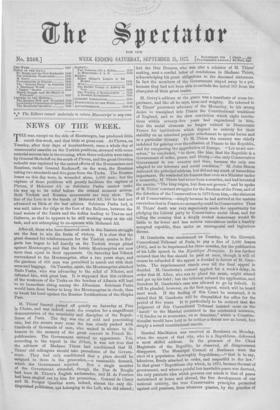M. Gr6vy's address at the grave was a manifesto of
some im- portance, and like all he says, terse and weighty. He referred to M. Thiers' persistent advocacy of the Monarchy, to his strong desire to transplant into France the Constitutional traditions of England, and to the slow conviction which eight revolu- tions within seventy-five years had engendered in him, that the social elements no longer existed in Democratic France for institutions which depend so entirely for their stability on an inherited popular attachment to special forms and to a particular dynasty. To M. Thiers the country was chiefly indebted for gaining over the adhesion of France to the Republic, and for conquering the approbation of Europe. "Let us set our- selves," he concluded, "to show, like him, that the Republic is a Government of order, peace, and liberty,—the only Conservative Government in our country and time, because the only one adapted to our interests and social condition." M. Jules Simon delivered the principal address, but did not say much of immediate importance. He reminded his hearers that even as a Minister under a monarchy, M. Thiers had never been a courtier, and had invented the maxim, "The king reigns, but does not govern ;" and he spoke of M. Thiers' constant struggles for the freedom of the Press, and of the defection of the Conservatives in 1873 from him,—the sincerest of all Conservatives,—simply because he had arrived at the mature conviction that in France no monarchy could be Conservative. Thus- M. Tillers' death was very sagaciously made the opportunity for pledging the Liberal party to Conservative social ideas, and for telling the country that a deeply rooted democracy would }Se liable to far fewer and leas serious convulsions under a frankly, accepted republic, than under an uncongenial and inglorious throne.






























